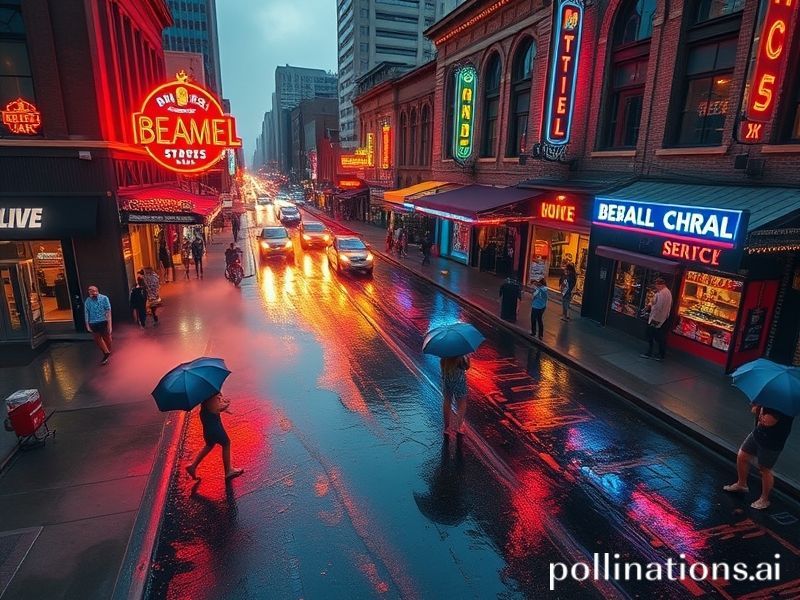Memphis Weather: The World’s Climate Chaos Lab Serving Hail, Heat & Existential Dread
MEMPHIS—While the rest of the planet argues about the correct temperature at which to serve beer, Memphis has decided to test-drive every setting on the cosmic thermostat—often before lunch. One moment the city is a convection oven that would make a Sicilian summer blush; the next, it’s auditioning for a minor role in the Book of Revelation. Locals call it “quirky.” Climate scientists call it “Tuesday.” The rest of us call it a convenient preview of the international climate roulette we’ve all quietly agreed to play.
Step outside Memphis International Airport and you’ll find the air thick enough to butter bread with. Meteorologically speaking, the city sits where subtropical moisture from the Gulf of Mexico shakes hands with the jet stream’s mid-latitude tantrums—an atmospheric cocktail hour that produces everything from softball-sized hail to heat indices that read like typos. If you want a one-sentence forecast, here it is: bring sunscreen, an ark, and a snow shovel; leave the optimism at coat-check.
The global significance? Memphis is a logistics artery—FedEx’s “SuperHub” moves roughly 3.3 million packages nightly, roughly one for every person who’ll eventually blame “unexpected weather” for their delayed insulin. When a supercell parks over the runway, the ripple hits Paris pharmacies, Tokyo part suppliers, and Lagos entrepreneurs within hours. In other words, your oat-milk latte might be late because a cumulonimbus over Tennessee decided to cosplay a neutron star.
Meanwhile, the Mississippi River—that lazy brown python snaking past Graceland—has developed the disconcerting habit of either flooding Beale Street or shrinking so low that barges scrape their keels on Civil-War-era trash. Both extremes are wonderfully on-brand for 2023: too much of everything, except the stuff you actually need. Lower water levels mean less grain gets exported, which nudges global wheat futures higher, which nudges Egyptian bread subsidies lower, which nudges political stability ever closer to the cliff edge. Somewhere, a hedge-fund algorithm just shorted civilization and booked a private jet to watch the sunset from 40,000 feet—weather permitting, of course.
Back on ground level, Memphians cope the way humans always have: by pretending the apocalypse is a perfectly normal season, like pollen or Christmas. They’ve turned emergency sirens into accidental sound art and turned heat advisories into small-talk currency. (“You think 107 °F is hot? My childhood garage hit 112 with 90 % humidity and we still played Monopoly.”) It’s the same coping mechanism you’ll find among farmers in Uttar Pradesh, fishermen in Cornwall, or anyone who’s noticed that insurance companies now sound like Buddhist monks—serene, detached, and quietly reciting the mantra “Act of God, not covered.”
Of course, the city still throws the best pity party in the South. When a rogue ice storm knocks out power, Memphians fire up backyard smokers before the bratwurst spoils, effectively turning a humanitarian crisis into a block party. It’s admirable, in the same way that rearranging deck chairs on the Titanic was technically interior design. The rest of the world should take notes: if you’re going to ignore decades of climate warnings, at least marinate the consequences properly.
International delegations occasionally swing through to study “resilience strategies,” which is diplomat-speak for “see how the locals survive without functioning infrastructure.” They leave clutching glossy brochures about community cooling centers and rain-garden initiatives, then fly home to their own flood-prone capitals where they’ll implement 5 % of the advice and hold three ribbon-cutting ceremonies. The circle of (after)life continues.
So the next time you refresh your weather app and see a Memphis forecast that simply reads “plagues,” remember: it’s not a bug, it’s a feature. The city is merely beta-testing the patch notes for Planet Earth 2.0—hotter, wetter, and intermittently airborne. If you can’t handle the preview, you’re really going to hate the global release.







